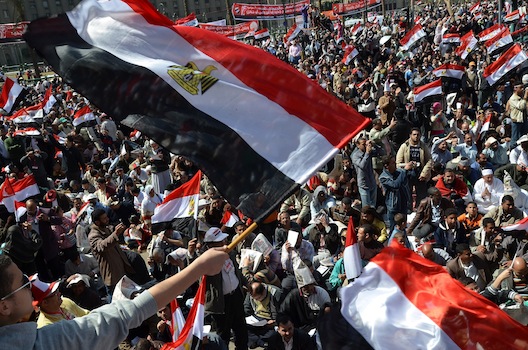 In the medium- to long-term, the fierce attack currently targeting the democratic hopes and aspirations of many groups of Egyptians, including Egypt’s youth, will only serve to cause these groups to step back momentarily and conduct some self-criticism, ultimately leading to changes in the methods by which these groups carry out their work.
In the medium- to long-term, the fierce attack currently targeting the democratic hopes and aspirations of many groups of Egyptians, including Egypt’s youth, will only serve to cause these groups to step back momentarily and conduct some self-criticism, ultimately leading to changes in the methods by which these groups carry out their work.
This is a time to take a step back and reflect, because the values of transfer of power, rule of law, and human rights and freedoms no longer occupy the forefront of public discourse, as was demonstrated in the recent months and during the presidential elections. It has once again become possible for government institutions and bodies, and for the elites allied with them, to ignore these values at little or no political cost. Indeed, consistent defense of these values (as opposed to sporadically defending them whenever the political climate is conducive), whether in politics, the media, or civil society spaces, carries the consequences of being labeled a traitor, enduring defamation, and facing hostility from state institutions. This is a time to take a step back and reflect, because large segments of the population (across barriers of economic status, social affiliations, and age – even if the majority is made up of the youth who demand democracy, social justice, and sustainable and autonomous development) have turned their backs on the discourse of those who defend rights and freedoms. They have once again placed their confidence in the “capable institutions” and the “saving hero” and bought into the discourse of “bread and security before freedom” and the idea of stability through authoritarian rule.
This is a moment for self-criticism and for changing methods of work, because the rational voices among the youth and other groups which defend democracy cannot afford to adopt a position of condescension. Such voices must avoid this by refusing to ignore or to ridicule the choices of certain segments of the population which no longer accept the discourse of transfer of power, rule of law, and rights and freedoms and which have instead embraced traditional tradeoffs. Furthermore, such voices must not engage in debates with those who are taking advantage of the current situation in Egypt by translating the choices of the people into fascism, collective punishment, and propaganda for individual rule. I myself had engaged in such debates on several occasions in the wake of July 2013, but I soon stopped because those who are taking advantage of Egypt’s situation do not expect to be confronted with real arguments and because I did not wish to contribute to the spread of their contradictory discourse by responding to it. Moreover, their real motives are already clear to the people, even to those who do not accept the discourse of democracy and who distance themselves from proponents of this discourse.
Rather, what is required is a return to daily, gradual attempts to approach the people on their own terms. It must be acknowledged that those who defend democracy have made the mistake of failing to address the economic and social conditions of the country and the daily concerns of its citizens. Further, their public and political engagement has been defined by severe reductionism, and this requires an apology.
Second, what is required is for the youth and other groups to realize that defending democracy will not lead to success – with “success” defined as a stable, well-developed state of popular acceptance – without reassuring the people of the cohesion of the state and society. Moreover, the positive link between democracy and societal cohesion must be demonstrated by emphasizing that rights, justice, rule of law, freedom, accountability, and transparency are central to ensuring the state’s cohesion and peace in society and to overcoming the threats which surround us. Indeed, making this link is the key to putting an end to the lies which have spread through defamation and accusations of treason – rather than attempting to confront such lies by clearing individual records or through courageous individual efforts to refute them.
Third, what is required is to gradually approach the people on a daily basis by combining development work (combating illiteracy and poverty, improving substandard basic services, and creating equal opportunities) with the agenda of rights and freedoms in a way that restores the confidence of the people in the positive relationship between freedom and bread and security.
Fourth, what is required is to overcome the all-or-nothing view which transforms politics either into historic victories or into existential defeats. Instead, we must search for the small, partial, and humble beginnings on the margins of politics, as political life in Egypt has been abused to the point of having lost all meaning. What is required is to manage differences by emphasizing the value of diversity – a diversity which accepts that some of those who are concerned with democracy participated in the presidential elections while others boycotted, without either side accusing or deriding the other.
Amr Hamzawy joined the Department of Public Policy and Administration at the American University in Cairo in 2011, where he continues to serve today. He is a former member of parliament, former member of the National Salvation Front, and founder of the Freedom Egypt Party.
This article originally appeared in Shorouk
Image: Photo: Ahmed Abd El-Fatah (Flickr)
